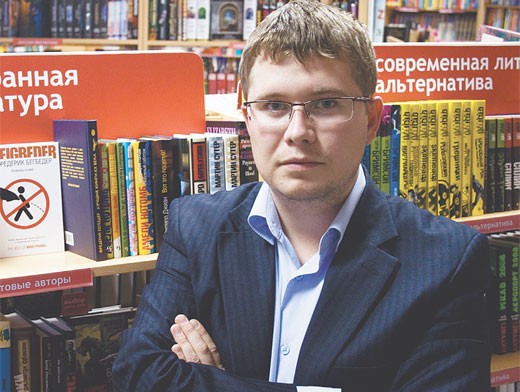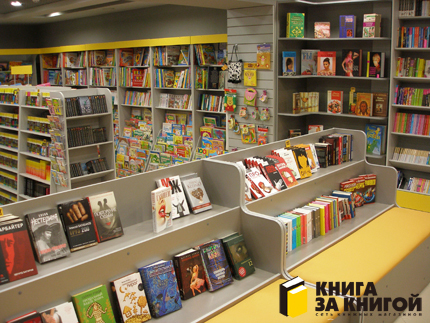Maxim Kotin: And nerds are doing business
I am writing notes from good books. This time the book is from the second list from Milfgard . This article is about a book about a young provincial innovation entrepreneur. The story is read in one breath and while reading all the time you worry about the hero: what will happen next and when will the collapse come =)

The book begins with a preface by Evgeny Chichvarkin. When I read this preface, I immediately wanted to remove the book from the reader. He writes very negatively E ... a genius about business in Russia. Here is a small quote: “... the Soviet rot did not go anywhere, but simply mutated. From the red mold turned white-blue-red. The flower of freedom grew in a rotten swamp, and its mold is winning ... ” I personally have such phrases causing a strong protest, however, I overcame myself by continuing to read. It turned out for good reason.
')
Interestingly, until the end of the book, I did not understand what kind of character I was talking about: fictional or real. The idea to search the Internet did not occur to me. However, at the end of the book, the author makes it clear that the character is real. I was convinced of this and the proof of this photo of the businessman Fedor Ovchinnikov above.
So, the bottom line is that a young provincial office employee decides to create his own business in a provincial city with two s (guess what kind of city). He opens a bookstore with intellectual literature “The Power of the Mind” on the sixth (!) Floor of the shopping center. In parallel, he decides to blog and write in him everything that happens with him and with his business. By the way, here is the link to the first entry of this blog.
For several years he has been working tirelessly, making progress and making mistakes. I'll write out most of his decisions here, and you yourself think (or read ) how erroneous or successful they were.
So, Fyodor Ovchinnikov created for three years an excellent network of bookstores. Buyers are happy, but fabulous profits never happened.

The book ends with the fact that Fedor no longer does the book business, but studies McDonald’s experience from the inside: fries french fries and says: “free ticket office”. What for? In order to open a network of fast foods. He learns good practices and how the staff deceives the owner.
Four years after the writing of the book by Maxim Kotin, Fyodor Ovchinnikov heads the network of franchised pizzerias. You can read more about this in the same blog .
PS: I really liked the book, despite the author’s not very good attitude (as it seemed to me) to his own country. But Mr. Kotin must be given his due: he processed a huge amount of material to write a good inspirational book about the realities of the provincial business. I propose to read it and share impressions in the comments.
I wish you happiness!

The book begins with a preface by Evgeny Chichvarkin. When I read this preface, I immediately wanted to remove the book from the reader. He writes very negatively E ... a genius about business in Russia. Here is a small quote: “... the Soviet rot did not go anywhere, but simply mutated. From the red mold turned white-blue-red. The flower of freedom grew in a rotten swamp, and its mold is winning ... ” I personally have such phrases causing a strong protest, however, I overcame myself by continuing to read. It turned out for good reason.
')
Interestingly, until the end of the book, I did not understand what kind of character I was talking about: fictional or real. The idea to search the Internet did not occur to me. However, at the end of the book, the author makes it clear that the character is real. I was convinced of this and the proof of this photo of the businessman Fedor Ovchinnikov above.
So, the bottom line is that a young provincial office employee decides to create his own business in a provincial city with two s (guess what kind of city). He opens a bookstore with intellectual literature “The Power of the Mind” on the sixth (!) Floor of the shopping center. In parallel, he decides to blog and write in him everything that happens with him and with his business. By the way, here is the link to the first entry of this blog.
For several years he has been working tirelessly, making progress and making mistakes. I'll write out most of his decisions here, and you yourself think (or read ) how erroneous or successful they were.
- Opened the first intellectual literature store in a provincial town
- I contacted a chain of grocery stores and began supplying cheap books to their shelves.
- Keep track of sales in Excel
- Invited to expand business partner
- I broke up with the first partner, buying out his share
- Began to use deferred payment for books that have not yet been sold.
- Opened a second store in a small satellite town
- Invited to the business of the second partner
- Opened two more stores
- Opened warehouse
- Opened a store in Vorkuta
- I bought a Toyota Camry, because I had long dreamed of a good car
- He opened a large store to occupy the premises of his store, which wanted to rent the federal network "Top-Book"
- Signed up for a state contract for the supply of textbooks to educational institutions
- I bought a large room in a 600 m² warehouse
- To purchase premises for a warehouse, he sold 25% of the enterprise to a new partner, retaining only 25% of the enterprise.
- He took a big loan for a new warehouse, bringing the credit load to 500 thousand / month.
- Opened a huge book hypermarket with an area of almost 600 m², despite loans and a huge cash gap
- Opened a discounter with stationery with his large warehouse
- I sold paper at a stationery store at a selling price from the manufacturer.
- Gave partners money out of circulation "in debt" in order to preserve the relationship
- Sold Toyota Camry to invest in money
- Opened in the satellite city a large book hypermarket
- Sold his share in the company (25%) to a competitor in office supplies
So, Fyodor Ovchinnikov created for three years an excellent network of bookstores. Buyers are happy, but fabulous profits never happened.

The book ends with the fact that Fedor no longer does the book business, but studies McDonald’s experience from the inside: fries french fries and says: “free ticket office”. What for? In order to open a network of fast foods. He learns good practices and how the staff deceives the owner.
Four years after the writing of the book by Maxim Kotin, Fyodor Ovchinnikov heads the network of franchised pizzerias. You can read more about this in the same blog .
PS: I really liked the book, despite the author’s not very good attitude (as it seemed to me) to his own country. But Mr. Kotin must be given his due: he processed a huge amount of material to write a good inspirational book about the realities of the provincial business. I propose to read it and share impressions in the comments.
I wish you happiness!
Source: https://habr.com/ru/post/286668/
All Articles